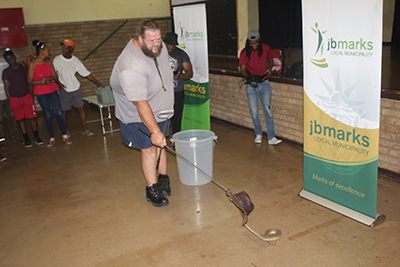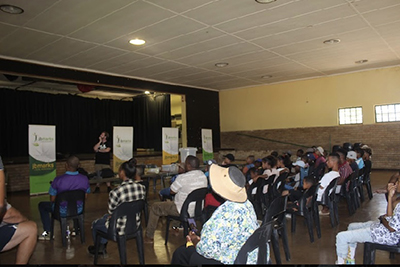As human beings, we are taught that we should respect all living things, but this can be a sensitive matter where snakes are concerned.
These reptiles are often portrayed as dangerous and evil creatures and this influences people’s attitude towards them, making them more feared because people do not have a lot of knowledge about snakes.
Snakes are an important part of biodiversity, and with more than 3 000 species across the world, they play an important role in maintaining the ecological balance. They help control the rodent population, which can cause significant crop damage and spread diseases, and their venom is also used in medical research to develop new drugs and treatments for various diseases.
The Snake Neighbourhood Awareness Knowledge and Education (SNAKE) programme, in partnership with the JB Marks municipality and the Potchefstroom Snake Removal Group, hosted an awareness event at the Promosa Community Hall on Saturday, 18 March.
Glenville Fransman, senior administrative assistant at the School of Biological Sciences of the North-West University (NWU), says that more and more people in areas such as Promosa, Ikageng and Mohadin have been complaining about snake sightings and snakes entering their homes. That is why he thought it was best to educate people about which snakes are venomous and which are not, and about the importance of snakes.
He says that he realised that the School of Biological Sciences is equipped with staff members and students who possess the necessary skills and expertise to educate people on this topic. The school then approached the JB Marks municipality for assistance and a successful event was presented.
The topics that were addressed included a demonstration on how to handle snakes, educating people on the importance of snakes, how to identify them and what procedure to follow when encountering a snake and, most importantly, whom to call.
“When someone is bitten by a snake, it is important to know what kind of snake it was so that the proper treatment can be administered. Knowing the difference between venomous and non-venomous snakes can also help people understand these reptiles better,” says Glenville.
During the awareness event the four types of venomous snakes that are found in the Potchefstroom region were also identified - the puff adder, the Cape cobra, the rinkhals and the boomslang.
Glenville says the event was a success, with close to 100 people in attendance.
“Snake awareness is crucial for safety, environmental conservation, medical emergencies and education. Learning about snakes can be fascinating and can help people appreciate the diversity of life on our planet. It can also help to dispel common myths and misconceptions about snakes, which will help reduce the fear and stigma associated with them,” he adds.
-STORY.jpg)
Collin Lengwasa, Cormac Price, Ronnie Afrika, Prof Che Weldon, Glenville Fransman and Francois Coetzee at the snake awareness event.

Piet Goosen from Snake Removal Potchefstroom demonstrates how snakes should be handled.

The event was a great success with close to 100 people in attendance.
